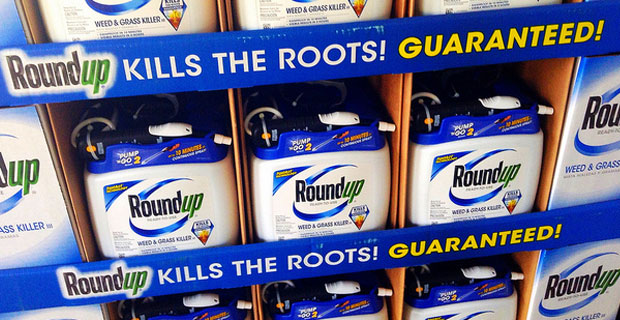17 Scientists Speak Out: Monsanto’s Roundup Is Causing Cancer

Are the full body protective suits not enough of a tip off that pesticides are toxic? If not, consider this: Monsanto’s Roundup herbicide – the most widely used and best-selling herbicide in the U.S. and one of the world’s most popular weed-killers – has been labeled a probable carcinogen by the International Agency for Research on Cancer.
The decision was made by IARC, the France-based cancer research arm of the World Health Organization, which considered the status of five insect and weed killers including glyphosate, which is used globally in industrial farming.
As reported by The Lancet:
“In March, 2015, 17 experts from 11
countries met at the International Agency for Research on Cancer (IARC;
Lyon, France) to assess the carcinogenicity of the organophosphate
pesticides tetrachlorvinphos, parathion, malathion, diazinon, and
glyphosate (table). These assessments will be published as volume 112 of
the IARC Monographs.”
pesticide_research_table
After analysis, it was determined that
glyphosate falls into the 2nd level of concern (mainly at industrial
use) of 4 levels for possible cancer-causing substances. The 4 levels
are:
Known carcinogens,
Probable or possible carcinogens (where
glyphosate stands)
Not classifiable
Probably not carcinogenic
The U.S. Environmental Protection Agency
said it would consider the French agency’s evaluation. But given US
government agencies’ decisions and political ties, hope is dismal that
they will do anything to limit its use. The EPA’s 2012 assessment of
glyphosate concluded that it met the statutory safety standards and that
the chemical could “continue to be used without unreasonable risks to
people or the environment.”
Though the agency analyzed numerous weed killers, glyphosate, being one of the most popular, is of greater concern. This active ingredient found in Monsanto’s Roundup herbicide currently holds the highest production volumes of any herbicide, used in more than 750 different products. Unfortunately, its use has skyrocketed in recent years due to the development of herbicide-resistant genetically modified crops – made to withstand copious amounts of herbicide spraying.
pesticide_mask_chemical_crop – CopyThough the ill effects from glyphosate exposure are most said to be concerning for occupational workers, tests revealing how ubiquitous the chemical really is should pave way for widespread concern.
Not only has glyphosate been detected in the air, in the water, and in our food, but it is also showing up in humans – despite the claims from Monsanto that the chemical is excreted from our bodies. Numerous studies have shown that not only is it causing numerous health problems, but it is showing up in urine samples, blood samples, and even breast milk. This is concerning.
“Glyphosate has been detected in the blood and urine of agricultural workers, indicating absorption. Soil microbes degrade glyphosate to aminomethylphosphoric acid (AMPA). Blood AMPA detection after poisonings suggests intestinal microbial metabolism in humans. Glyphosate and glyphosate formulations induced DNA and chromosomal damage in mammals, and in human and animal cells in vitro.
One study reported increases in blood markers of chromosomal damage (micronuclei) in residents of several communities after spraying of glyphosate formulations. Bacterial mutagenesis tests were negative. Glyphosate, glyphosate formulations, and AMPA induced oxidative stress in rodents and in vitro. The Working Group classified glyphosate as “probably carcinogenic to humans.”
Needless to say, Roundup creator and biotech giant Monsanto strongly disagreed with the decision.
“All labeled uses of glyphosate are
safe for human health,” said Phil Miller, a Monsanto spokesman, in a
statement.
This article originally appeared at
Natural Society.
Source(s):
infowars.com
http://www.healthfreedoms.org/17-scientists-speak-out-monsantos-roundup-is-causing-cancer/